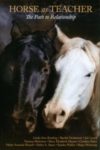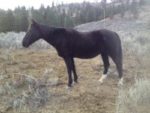Not All Pain is the Same- Part 2
By Madalyn Ward, DVM
Sometimes diagnosing our horses’ pain can be a pain in the you-know-what! Our horses don’t speak English, and they can’t tell us exactly what hurts or why. That’s why understanding the different kinds of pain, especially from a Traditional Chinese Medicine (TCM) point of view, can be so valuable.
This information can be difficult to digest at first, but you’ll find that in time you will be able to distinguish one kind of pain from another based on your horse’s symptoms. In last month’s newsletter I covered excess pain conditions, and this month I review deficiency pain conditions.
+++ Deficiency Pain Conditions +++
Deficiency pain conditions result from malnutrition of the muscles and tendons due to an inadequate supply of Qi (life energy) and Blood to an area. Causes of deficiency pain include:
Overuse of an area, especially in an older animal
Systemic deficiency of Qi and Blood
Old age
The type of pain in a deficiency condition is
Dull
Better with pressure
Better with rest
Develops slowly during the day
+++ How to Treat Deficiency Pain Conditions +++
The TCM treatment of chronic pain from deficiency is to tonify (nourish) the Qi and Blood. Foods which especially nourish Blood include alfalfa, high-chlorophyll foods such as blue green algae, and Equilite Four Hooves. To build Qi the focus needs to be on providing a high-quality diet and supporting digestion with pre- or probiotics, and digestive enzymes.
Joint supplements that contain glucosamine help nourish joints and connective tissues. Natural antioxidants such as Noni or Xango juice neutralize free radicals, which helps prevent the chronic cycle of inflammation from ever starting, so they are useful for both excess and deficiency conditions. Other natural antioxidants include CoQ10, wheat sprouts, natural vitamin C, and bioflavonoid. Many herbs also have anti-inflammatory and antioxidant properties, and can be used to treat deficiency pain conditions.
Poultices, ice, and hydrotherapy will not be helpful in alleviating deficiency pain. Heating liniments such as Formula 11 can help bring circulation to the tissues, but the body must first be nourished so that healing nutrients are available.
Understanding the difference between excess and deficiency chronic pain conditions can help you decide on the best treatment plan for your horse.
Madalyn Ward, DVM, owns Bear Creek Veterinary Clinic in Austin, Texas. She is certified in Veterinary Homeopathy and Equine Osteopathy. Memberships include American Veterinary Medical Association, American Association of Equine Practitioners, American Holistic Veterinary Medical Association, Texas Veterinay Medical Association and the Academy of Veterinary Homeopathy. She has authored several books and publishes the monthly newsletter, “Holistic Horsekeeping.”
A Personal Word from the Author
My name is Madalyn Ward, and I graduated from Texas A&M University in 1980. I worked in an equine practice until 1985, then started my own practice at Bear Creek Veterinary Clinic in Austin, Texas. After four more years of practice, I remained frustrated about many aspects of western medicine. Despite regularly attending conferences, consulting with experts and reading all the latest literature, I was still not curing many chronic conditions. I also found many standard conventional practices very invasive and unappreciated by my patients. I wanted my patients to live happier as well as healthier lives.
In 1989 I started seeking out information and training in alternative healing methods. I was and continue to be amazed at the wealth of knowledge about true healing — knowledge largely ignored by conventional teaching institutions. I find the horse-owning public and practicing veterinarians who have faced similar frustrations are open to alternative methods.
I want to share the information I have and encourage others to do the same, for the benefit of horses everywhere.
Dr. Madalyn Ward, D.V.M.
Contact
Madalyn Ward DVM
11608 FM 1826
Austin, TX 78737
303-575-1170
You can visit her website: www.holistichorsekeeping.com to read more about holistic horse treatments. There will also be more info



